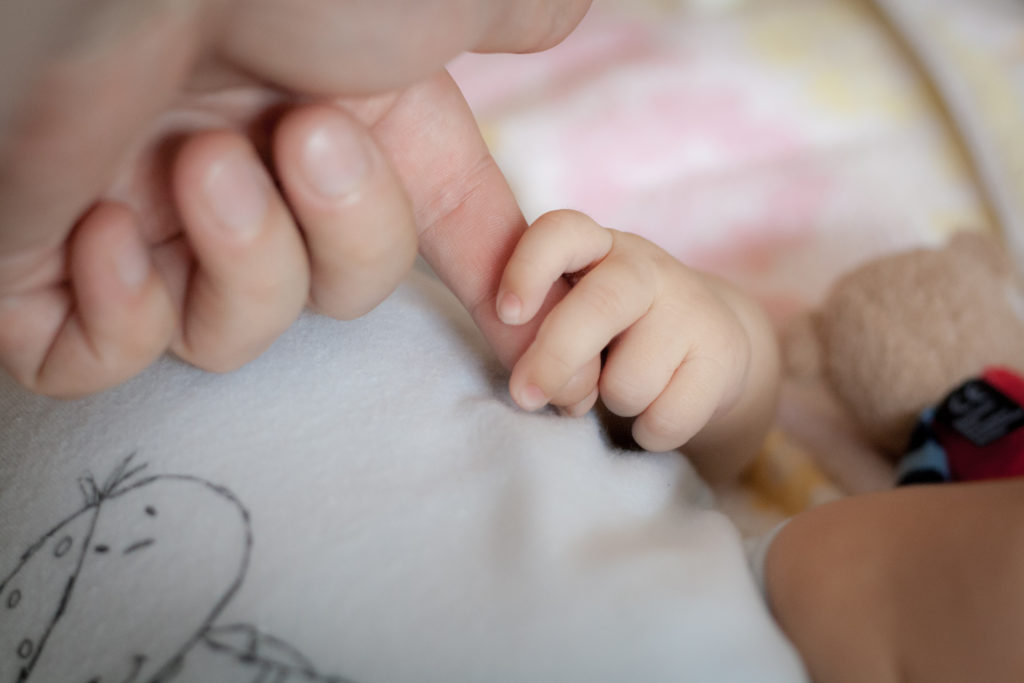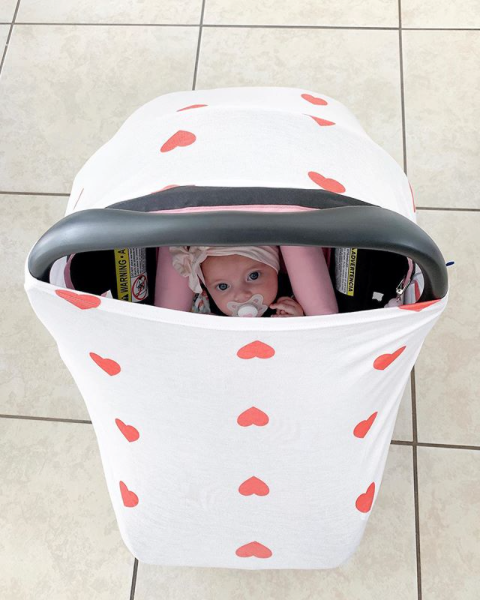
Secrets Before Giving Birth:
7 Secrets Every Woman Must Know Before Giving Birth by Christine Sterling, M.D.

I bet you are excited about the arrival of your new baby.
But are you ready for what comes after birth?
I know I wasn’t.
As an Ob/Gyn, I thought of all people I was prepared for. I never expected to be so overwhelmed. I never expect to be bawling my eyes out at 3 am wondering, “Why didn’t anyone tell me?”. Also, I never expected to be revealing my private struggles.
But here I am. I am here to tell you the things no one told me. I am here to tell you the truth about what comes after birth.
Moreover, I will warn you— if you want to believe the newborn period is going to be all about love, snuggles, and happiness then you definitely do not want to read further.
But if you want to peek behind the curtain, if you want to have all the information beforehand, if you want to be prepared— keep reading.
Now, let me share 7 of the top 10 challenges of the 4th Trimester. (Make sure to check out the end of the article for a link to the full list— it’s too long to share here.)
1. Breastfeeding
Almost immediately after delivery, your breastfeeding journey will begin.
It will likely be painful.
You will question whether it is appropriately painful or whether you are doing it wrong. People will give you contradictory advice. You will not know who or what to trust.

You will probably cry over breastfeeding— more than once. Maybe you won’t make enough and you will feel constant pressure to keep up. Maybe you will make too much and you’ll feel full all the time. At some point, you will probably get engorged or a plugged duct or mastitis and feel awful.
Meanwhile, everyone else is telling you that breastfeeding is beautiful, natural, and motherly. The truth is that while breastfeeding can be all of these things, it can also be extremely challenging. It certainly was for me.
I don’t want to scare you away from breastfeeding. The benefits of breast milk are undeniable. But I am also not interested in pretending it’s going to be easy. The good news is that these days there are more and more resources for lactating mothers. I’ve listed my favorites below. Make sure to bookmark them for easy 3 am access!
Find breastfeeding support groups and lactation consultants
READ: HOW MUCH SHOULD A NEWBORN BREASTFEED?
2. Your Changing Body
The physical recovery from birth is going to be more intense than you expect.
Recently, a friend of mine, who is also an Ob/Gyn, had a baby. A few days after birth she texted me, “I feel like nothing is going right in my body.” Even those of us with big fancy degrees and years of training in this field are blown away by the experience.
You will be too.
You will be in large mesh underwear with giant pads— your very own postpartum diaper, super sexy.
For the first few days, you will experience painful cramping that feels like labor contractions.
You will be bleeding for up to 6 weeks, sometimes a little more.
You will likely have stitches, either in your vagina or on your belly. Either way, it will hurt to move. #YouArentDoneWaddlingYet
And the first poop after delivery…
Hold on, tight ladies. Let’s just say, you are not going to look forward to peeing and pooping.
To top it all off, your postpartum body will feel unfamiliar, foreign even. The baby is gone. The bump is not. Most women continue to look pregnant for weeks to months. A culture of celebrity bounce backs and “body after baby” advertising has set unrealistic expectations for all of us. I’m going to strongly recommend against comparing yourself to others on social media. In my experience, it does not end well*. Social media isn’t all bad when it comes to postpartum bodies, just see here and here.
Having the right supplies can make recovery much easier. But knowing exactly what you need can be tricky. Fortunately, I’ve done the work for you— check out my Ultimate Postpartum Kit Checklist.
*not well= ugly crying on the bathroom floor
3. Sleep Deprivation
#RealTalk there is a reason sleep deprivation is used as a torture mechanism. The impact of the disruption to your normal sleep-wake cycle during this period cannot be overstated. You are simply not yourself on such a small amount of sleep. Sleep deprivation has a profound impact on your emotional well-being and your ability to communicate. Nothing can replace sleep, but entering this period knowing that you will not be your best self can help set realistic expectations.

If you remember nothing else from this list, I need you to remember this— if you are really struggling after the birth of your baby, the first thing you must do is get yourself 4 to 5 hours of uninterrupted sleep. I don’t care if you have to supplement or have someone drive the baby across town, the most important tool for a struggling momma is sleep.
4. Relationship Changes
Everyone likes to share how watching their partner bond with a baby made them fall even more in love.
The problem is— that’s only part of the story.
The other part of the story is one of the best-kept secrets in the world.
On average, marriage satisfaction declines after the birth of a child. If you think about it, it’s not surprising.
You and your partner are going to be co-project managers— of a human being. You both are going to care a lot about the outcome. Also, you will not agree on everything. Disagreement + sleep deprivation = trouble.
We all think it’s not going to happen to us— that our relationship is different, stronger.
And then it does, it happens to us.
I don’t share this to scare you. I just don’t want you arguing with your partner and feeling like it’s just you guys— it isn’t.
Don’t despair. There are tools that can help you get through this difficult time. Make sure to check out this post where I share my #1 tip for keeping your relationship strong when the going gets tough.
DON’T MISS: HOW DO I PREPARE FOR CHILDBIRTH?
5. Postpartum Blues
Are you a crier?
If not, the postpartum blues have quite a surprise for you!
Studies show 80% of women experience postpartum blues, though I suspect the percentage is actually higher.
Since you will likely experience the blues, let me break it down for you a little.
You will feel overwhelmed.
Many women feel vulnerable.
One minute you are happy, the next frustrated and crying. Feelings of sadness, often for no particular reason, are common.

Hormonal fluctuations, along with the other difficulties of the 4th trimester, are to blame for these emotional changes. The postpartum blues typically peak around the time you get home from the hospital and last a maximum of 2 weeks. When planning visitors, keep in mind that it can be difficult to put on a happy face during this period. The support of people who love you unconditionally at your most raw and vulnerable is always a good idea. But you may want to wait and see how you are doing once you get home before inviting the other kind of visitors into your home.
6. Postpartum Mood and Anxiety Disorders
Just like the rest of your body, your brain will be adjusting to substantial hormonal changes, sleep deprivation, and a drastic change in your routine. This places new parents, even those with no prior history, at risk of postpartum mood and anxiety disorders. Studies show that up to 20% of women will develop postpartum depression.
Symptoms often include:
- Feeling sad, hopeless, empty, or overwhelmed
-
Crying more often than usual or for no apparent reason
-
Worrying or feeling overly anxious
-
Feeling moody, irritable, or restless
-
Oversleeping or being unable to sleep even when the baby is asleep
-
Having trouble concentrating, remembering details, or making decisions
-
Experiencing anger or rage
-
Losing interest in activities that are usually enjoyable
-
Suffering from physical aches and pains, including frequent headaches, stomach problems, and muscle pains
-
Eating too little or too much
-
Excessive feelings of guilt
-
Withdrawing from or avoiding friends and family
-
Having trouble bonding with or forming an emotional attachment to your baby
-
Persistently doubting your ability to care for your baby
-
Thinking about harming yourself or your baby
Resources for postpartum mood and anxiety disorders:
7. Bonding with baby
Everyone likes to tell the story of immediate, overwhelming, earth-shattering love for their baby.
While I hope this is your experience, I want to caution you not to expect the heavens to part immediately after birth.
This is not the norm.
Most parents bond with their babies over weeks to months. We prefer the idea of love driving us to care for our children. However, it is usually the act of caring for our baby that builds the bond. We first care for our child because we know we are supposed to and eventually do so out of love and devotion.

For those of you who experience Hello immediate, intense love, the strength of the bond can be scary and leave you feeling exposed. But it can also be frightening if the bond takes longer to develop than you expected.
You will get there, I promise. We all end up obsessed with our kids.
Struggling To Bond With Your You’re A Alone by RisaKirslake
Emotional and Social Development 0 to 3 months by the American Academy of Pediatrics
In Summary:
So there you have it, the top 7 secrets of the 4th trimester. You can access the full list of secrets, along with more resources to navigate them, here.
I know it seems like a lot, but do not despair. There are things you can be doing right now to get ready.
To learn more about preparing for the 4th trimester, follow me on Instagram (and make sure to say Hi if you do!).
 About the Author: Dr. Christine Sterling, M.D. is an Ob/Gyn and mom on a mission to solve one of the biggest problems facing mothers today. Far too little time is spent discussing the emotional journey of pregnancy and preparing women for the reality of birth and the 4th trimester. Dr. Sterling teaches women all over the world the 3 keys to transforming their pregnancy, birth, and postpartum journey.
About the Author: Dr. Christine Sterling, M.D. is an Ob/Gyn and mom on a mission to solve one of the biggest problems facing mothers today. Far too little time is spent discussing the emotional journey of pregnancy and preparing women for the reality of birth and the 4th trimester. Dr. Sterling teaches women all over the world the 3 keys to transforming their pregnancy, birth, and postpartum journey.
Join us at the PB Moms Exclusive Circle, where we invite healthcare experts to prepare us for life after childbirth and motherhood. Go to: pregnancybeyond.com/exclusive-circle.
Follow PregnancyBeyond on Instagram, Facebook, and Twitter.
i Gabbe, Steven G. Obstetrics: normal and problem pregnancies. Elsevier, 2017. ii “Postpartum Depression Facts.” National Institute of Mental Health, U.S. Department of Health and Human Services, www.nimh.nih.gov/health/publications/postpartum-depression-facts/index.shtml.
BABY ON THE WAY BIRTH STORY BREASTFEEDING FIRST TIME MOM GUEST POST PREGNANCY WOMENS HEALTH







